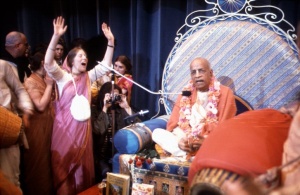CC Madhya 13.153: Difference between revisions
m (1 revision(s)) |
(Vanibot #0054 edit - transform synonyms into clickable links, which search similar occurrences) |
||
| (One intermediate revision by one other user not shown) | |||
| Line 1: | Line 1: | ||
{{ | [[Category:Sri Caitanya-caritamrta - Madhya-lila Chapter 13|C153]] | ||
<div style="float:left">'''[[Sri Caitanya-caritamrta|Śrī Caitanya-caritāmṛta]] - [[CC Madhya|Madhya-līlā]] - [[CC Madhya 13|Chapter 13: The Ecstatic Dancing of the Lord at Ratha-yātrā]]'''</div> | |||
<div style="float:right">[[File:Go-previous.png|link=CC Madhya 13.152|Madhya-līlā 13.152]] '''[[CC Madhya 13.152|Madhya-līlā 13.152]] - [[CC Madhya 13.154|Madhya-līlā 13.154]]''' [[File:Go-next.png|link=CC Madhya 13.154|Madhya-līlā 13.154]]</div> | |||
{{CompareVersions|CC|Madhya 13.153|CC 1975|CC 1996}} | |||
{{RandomImage}} | |||
==== TEXT 153 ==== | ==== TEXT 153 ==== | ||
<div | <div class="verse"> | ||
sei satī premavatī, premavān sei pati, | :sei satī premavatī, premavān sei pati, | ||
viyoge ye vāñche priya-hite | :viyoge ye vāñche priya-hite | ||
nā gaṇe āpana-duḥkha, vāñche priyajana-sukha, | :nā gaṇe āpana-duḥkha, vāñche priyajana-sukha, | ||
sei dui mile acirāte | :sei dui mile acirāte | ||
</div> | </div> | ||
| Line 14: | Line 18: | ||
==== SYNONYMS ==== | ==== SYNONYMS ==== | ||
<div | <div class="synonyms"> | ||
sei | ''[//vanipedia.org/wiki/Special:VaniSearch?s=sei&tab=syno_o&ds=1 sei] [//vanipedia.org/wiki/Special:VaniSearch?s=satī&tab=syno_o&ds=1 satī]'' — that chaste wife; ''[//vanipedia.org/wiki/Special:VaniSearch?s=prema&tab=syno_o&ds=1 prema]-[//vanipedia.org/wiki/Special:VaniSearch?s=vatī&tab=syno_o&ds=1 vatī]'' — full of love; ''[//vanipedia.org/wiki/Special:VaniSearch?s=prema&tab=syno_o&ds=1 prema]-[//vanipedia.org/wiki/Special:VaniSearch?s=vān&tab=syno_o&ds=1 vān]'' — loving; ''[//vanipedia.org/wiki/Special:VaniSearch?s=sei&tab=syno_o&ds=1 sei] [//vanipedia.org/wiki/Special:VaniSearch?s=pati&tab=syno_o&ds=1 pati]'' — that husband; ''[//vanipedia.org/wiki/Special:VaniSearch?s=viyoge&tab=syno_o&ds=1 viyoge]'' — in separation; ''[//vanipedia.org/wiki/Special:VaniSearch?s=ye&tab=syno_o&ds=1 ye]'' — who; ''[//vanipedia.org/wiki/Special:VaniSearch?s=vāñche&tab=syno_o&ds=1 vāñche]'' — desire; ''[//vanipedia.org/wiki/Special:VaniSearch?s=priya&tab=syno_o&ds=1 priya]-[//vanipedia.org/wiki/Special:VaniSearch?s=hite&tab=syno_o&ds=1 hite]'' — for the welfare of the other; ''[//vanipedia.org/wiki/Special:VaniSearch?s=nā&tab=syno_o&ds=1 nā] [//vanipedia.org/wiki/Special:VaniSearch?s=gaṇe&tab=syno_o&ds=1 gaṇe]'' — ''and do not care; ''[//vanipedia.org/wiki/Special:VaniSearch?s=āpana&tab=syno_o&ds=1 āpana]-[//vanipedia.org/wiki/Special:VaniSearch?s=duḥkha&tab=syno_o&ds=1 duḥkha]'' — for personal unhappiness; ''[//vanipedia.org/wiki/Special:VaniSearch?s=vāñche&tab=syno_o&ds=1 vāñche]'' — desire; ''[//vanipedia.org/wiki/Special:VaniSearch?s=priya&tab=syno_o&ds=1 priya]-[//vanipedia.org/wiki/Special:VaniSearch?s=jana&tab=syno_o&ds=1 jana]-[//vanipedia.org/wiki/Special:VaniSearch?s=sukha&tab=syno_o&ds=1 sukha]'' — ''the happiness of the dearmost beloved; ''[//vanipedia.org/wiki/Special:VaniSearch?s=sei&tab=syno_o&ds=1 sei]'' — those; ''[//vanipedia.org/wiki/Special:VaniSearch?s=dui&tab=syno_o&ds=1 dui]'' — two; ''[//vanipedia.org/wiki/Special:VaniSearch?s=mile&tab=syno_o&ds=1 mile]'' — meet; ''[//vanipedia.org/wiki/Special:VaniSearch?s=acirāte&tab=syno_o&ds=1 acirāte]'' — without delay. | ||
</div> | </div> | ||
| Line 21: | Line 25: | ||
==== TRANSLATION ==== | ==== TRANSLATION ==== | ||
<div | <div class="translation"> | ||
“Such a loving, chaste wife and loving husband desire all welfare for each other in separation and do not care for personal happiness. Desiring only each other’s well-being, such a pair certainly meet again without delay. | “Such a loving, chaste wife and loving husband desire all welfare for each other in separation and do not care for personal happiness. Desiring only each other’s well-being, such a pair certainly meet again without delay. | ||
</div> | </div> | ||
__NOTOC__ | |||
<div style="float:right; clear:both;">[[File:Go-previous.png|link=CC Madhya 13.152|Madhya-līlā 13.152]] '''[[CC Madhya 13.152|Madhya-līlā 13.152]] - [[CC Madhya 13.154|Madhya-līlā 13.154]]''' [[File:Go-next.png|link=CC Madhya 13.154|Madhya-līlā 13.154]]</div> | |||
__NOTOC__ | |||
__NOEDITSECTION__ | |||
Latest revision as of 21:38, 19 February 2024

His Divine Grace
A.C. Bhaktivedanta Swami Prabhupada
A.C. Bhaktivedanta Swami Prabhupada
TEXT 153
- sei satī premavatī, premavān sei pati,
- viyoge ye vāñche priya-hite
- nā gaṇe āpana-duḥkha, vāñche priyajana-sukha,
- sei dui mile acirāte
SYNONYMS
sei satī — that chaste wife; prema-vatī — full of love; prema-vān — loving; sei pati — that husband; viyoge — in separation; ye — who; vāñche — desire; priya-hite — for the welfare of the other; nā gaṇe — and do not care; āpana-duḥkha — for personal unhappiness; vāñche — desire; priya-jana-sukha — the happiness of the dearmost beloved; sei — those; dui — two; mile — meet; acirāte — without delay.
TRANSLATION
“Such a loving, chaste wife and loving husband desire all welfare for each other in separation and do not care for personal happiness. Desiring only each other’s well-being, such a pair certainly meet again without delay.